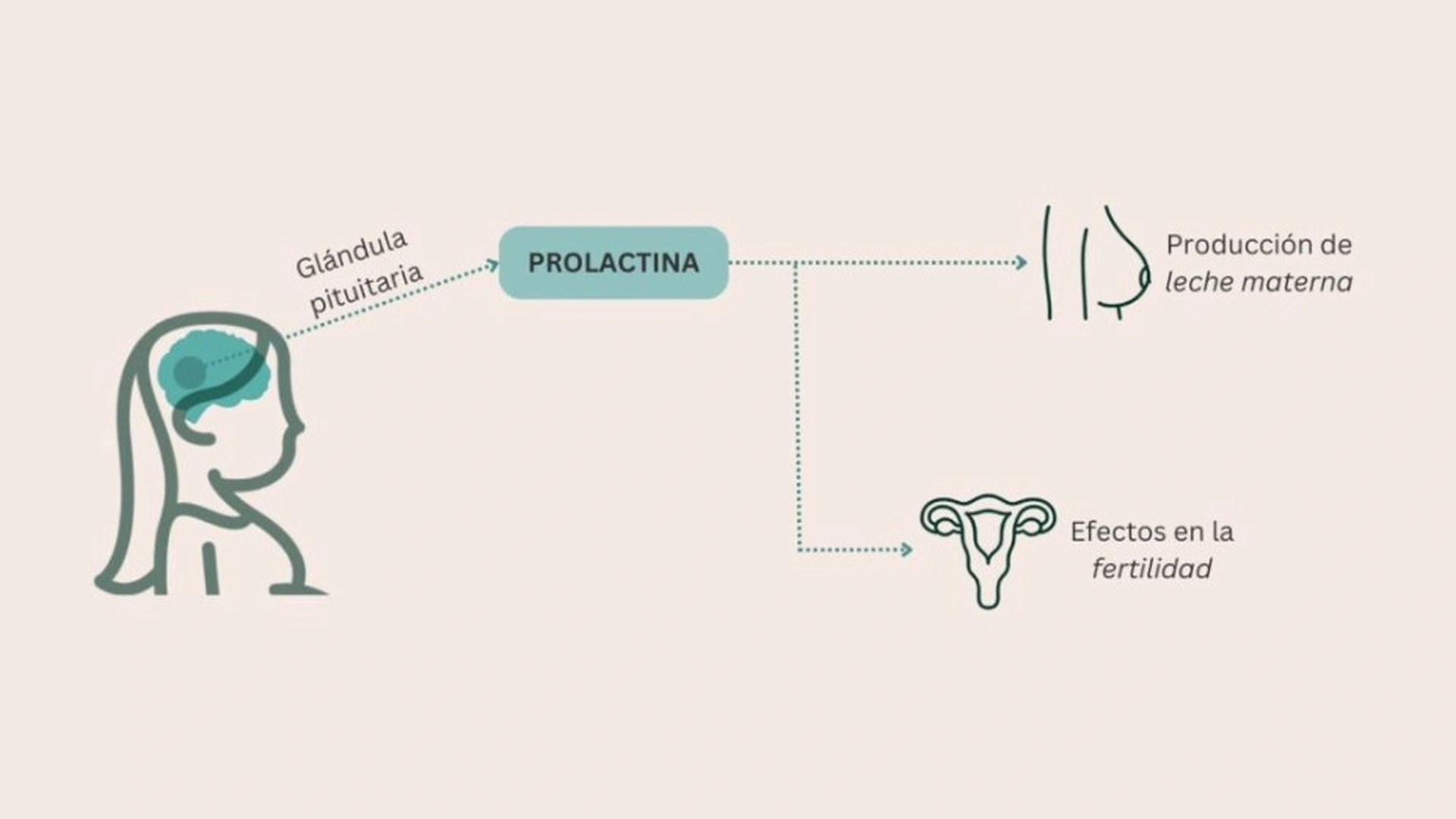

What is prolactin and why is it important?
In this article, we explore the main causes of high prolactin and the treatment options available for high prolactin.
Prolactin is a vital hormone in the human body, produced by the pituitary gland. Although it is generally associated with breastfeeding, as it stimulates milk production in women after childbirth, it also plays an important role in men, helping to regulate reproductive function and other metabolic processes.
Main functions of prolactin:
In women: Promotes lactation during the postpartum period.
In men: Influences testosterone production and reproductive function.
In both sexes: Regulates the immune system and participates in the creation of new blood cells.

Diagram illustrating the role of prolactin in the human body, especially in women.
What does having high prolactin levels mean?
When prolactin levels are higher than normal, a condition known as hyperprolactinemia occurs. This can have a number of health implications for both men and women and can interfere with fertility and the menstrual cycle.
Main causes of high prolactin
High prolactin can be caused by a variety of factors. Below, we explore the main causes of this condition:
1. Prolactinoma
Prolactinoma is a benign tumour in the pituitary gland that can cause an increase in prolactin. It is one of the most common causes of hyperprolactinemia and can be effectively treated with medication.
2. Medications
Certain medications can raise prolactin levels, such as:
- Antipsychotics
- Antidepressants
- Blood pressure medications
- Antihistamines
3. Hypothyroidism
Thyroid insufficiency can also be responsible for increased prolactin. When the thyroid gland does not produce enough hormone, the pituitary gland may compensate by producing more prolactin.
4. Stress and intense exercise
Prolonged physical or emotional stress can temporarily increase prolactin levels. It has also been observed that intense or excessive exercise can trigger an increase in this hormone.
5. Other less common causes:
- Liver disease or kidney failure
- Brain injury or surgery in the pituitary gland area
- Hypogonadism (dysfunction in the production of sex hormones)
Symptoms of high prolactin
The symptoms of high prolactin can vary depending on gender and the severity of the case. These are some of the most common symptoms:
In women:
- Menstrual irregularities: Menstrual cycles may become irregular or even absent.
- Milk secretion: In some women, high prolactin can cause milk secretion outside of pregnancy or breastfeeding, known as galactorrhea.
- Infertility: Hyperprolactinemia can interfere with ovulation and make it difficult to become pregnant.
In men:
- Infertility: Sperm production may be affected, decreasing the chances of conception.
- Decreased libido: Elevated prolactin levels can reduce sexual desire.
- Erectile dysfunction: Lack of testosterone can lead to erection problems.
Diagnosis of high prolactin
The diagnosis of high prolactin usually begins with a blood test to measure prolactin levels. If the results indicate an increase, doctors often proceed with additional tests, such as:
- Magnetic resonance imaging (MRI): To check for the presence of a prolactinoma or other problems in the pituitary gland.
- Thyroid function tests: To evaluate possible thyroid dysfunction.
- Additional hormone tests: To rule out other hormonal disorders or underlying conditions.
Treatments for high prolactin
Treatment depends on the underlying cause of hyperprolactinemia. Here are the most common approaches:
1. Medications
- Dopamine agonists: Medications such as cabergoline and bromocriptine are the first-line treatments for reducing prolactin levels and shrinking tumours in cases of prolactinoma.
- Medications for hypothyroidism: If the cause is thyroid dysfunction, treatment with thyroid hormones can normalise prolactin levels.
2. Surgery
In some cases, if the prolactinoma does not respond to drug treatment, surgery may be used to remove the tumour. This procedure is performed through the nose, using a technique called transsphenoidal surgery.
3. Radiotherapy
In rare cases, if the tumour cannot be removed with surgery or medication, radiotherapy may be considered.
Risks of not treating high prolactin
If high prolactin is not treated properly, it can lead to long-term health problems, such as:
Persistent infertility: Without treatment, infertility caused by high prolactin can become chronic...
Osteoporosis: A lack of oestrogen or testosterone in the body can reduce bone density.
Cardiovascular problems: Hormonal imbalances can increase the risk of heart disease.
Book a free consultationDo you have any questions or need more information?
At Fertility Madrid, we specialise in treatments such as egg donation, in vitro fertilisation and artificial insemination, among others.
Please do not hesitate to contact our professionals at our fertility clinic and they will answer all your questions without obligation.
Other interesting news


Is a natural pregnancy possible with low ovarian reserve?

Endometriosis: Symptoms the Disease, Effective Treatments, and FAQ

Exercise and Fertility Treatment: Is it Safe to Stay Active?

How to cope with an egg donation treatment?
